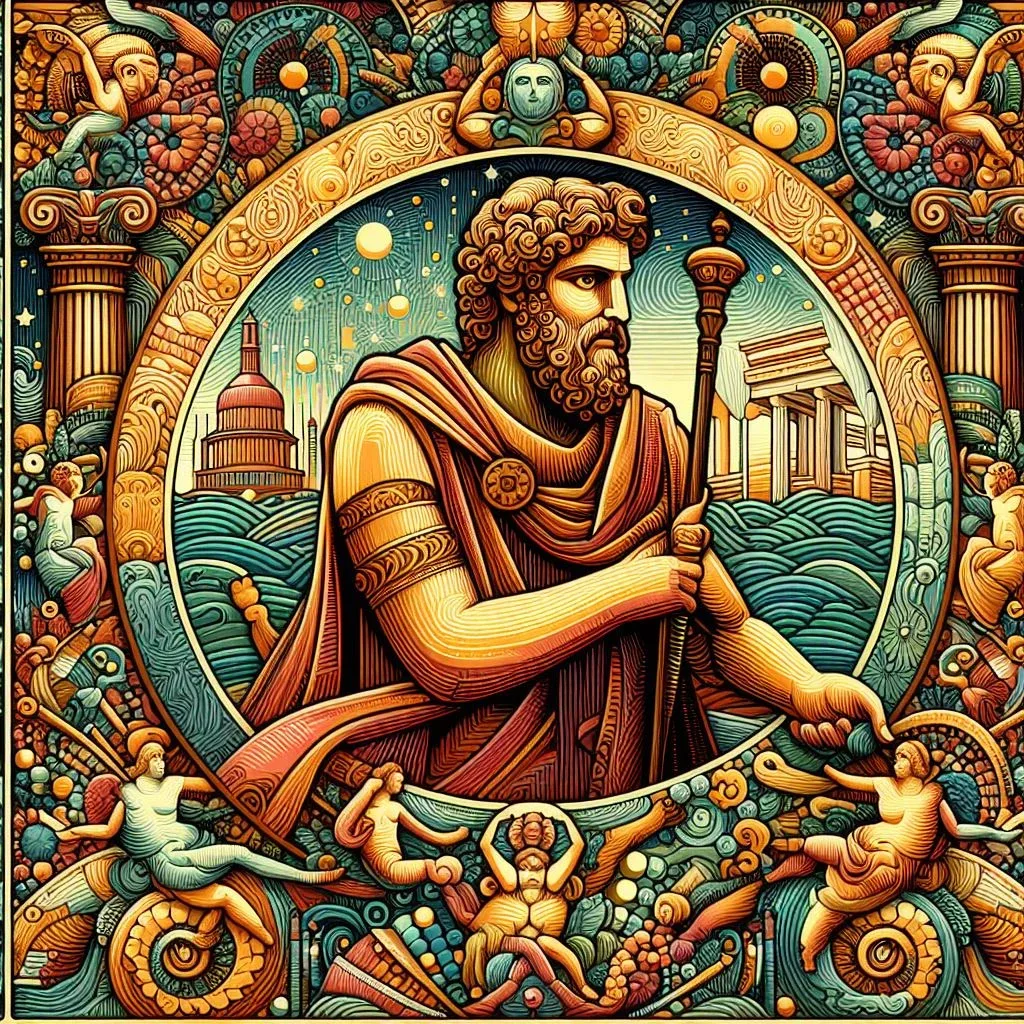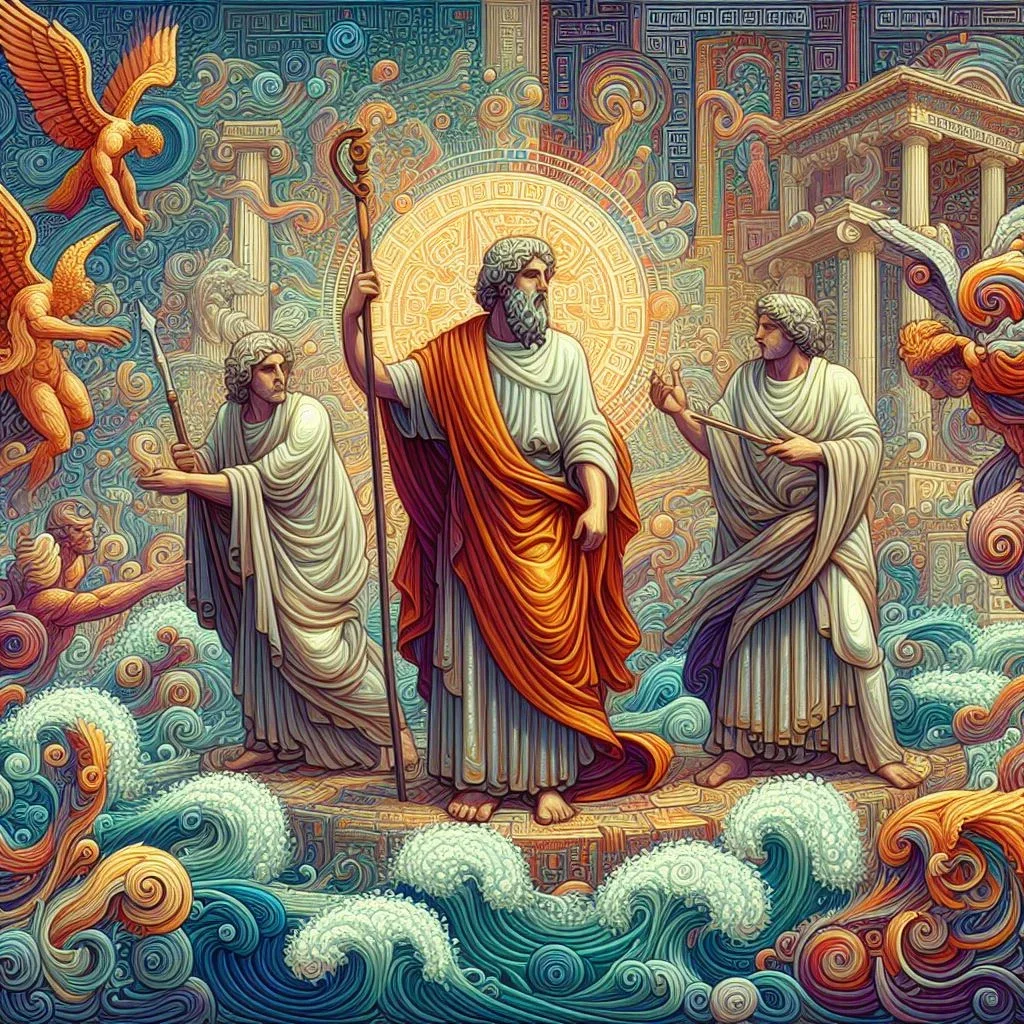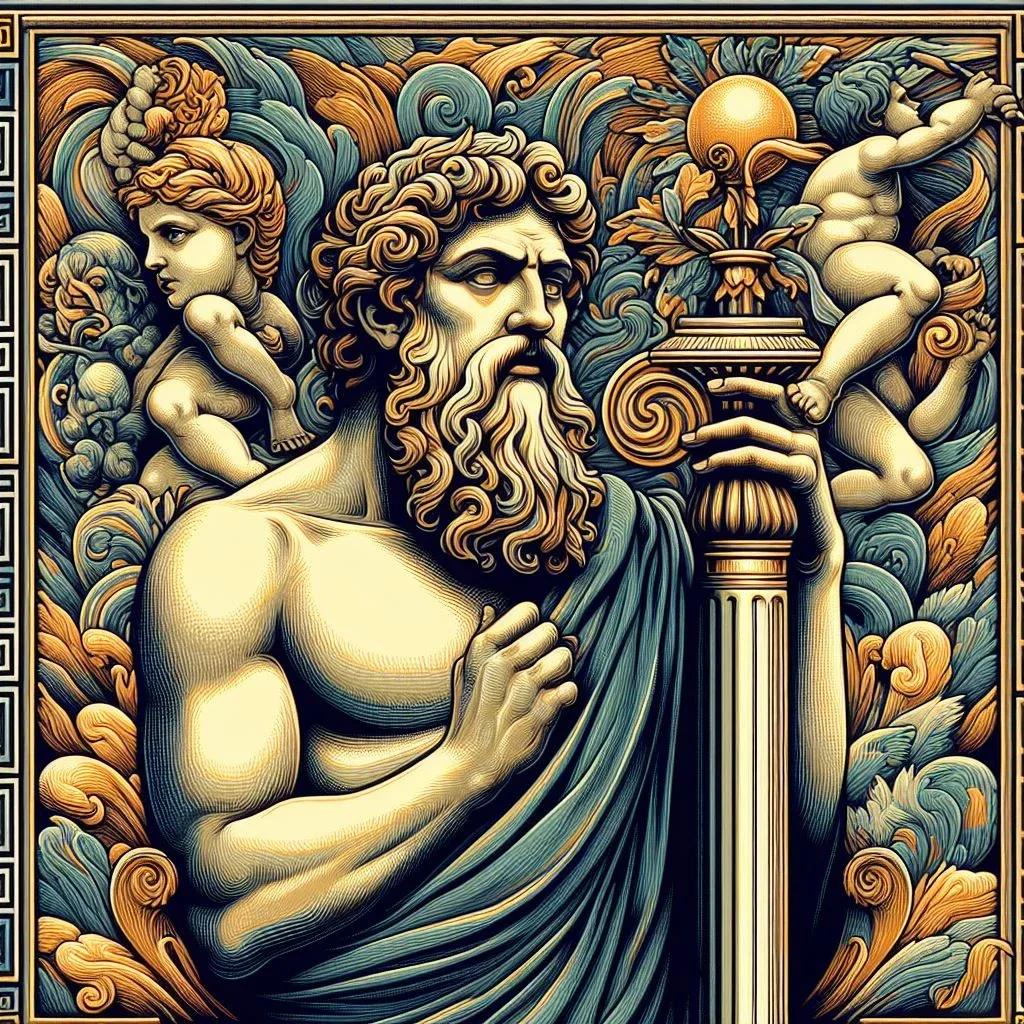Perseus of Citium was a Stoic philosopher who lived in the 3rd century BC. He was born in Scythium, in Ancient Greece, the son of Demetrius. Perseus was a disciple of Zeno of Citium, the founder of Stoicism. His relationship with Zeno was very significant, as Perseus not only studied with him, but also lived in the same house.
Some accounts claim that Perseus was a slave of Zeno, while others suggest that he was an amanuensis and dedicated student. Perseus played an important role in the court of King Antigonus II Gonatas and left a philosophical legacy through his works, although only fragments of them have survived to this day.

His works cover ethical and political topics such as the pursuit of virtue, self-reliance, and justice. His influence on Stoicism after Zeno's death was significant, and he is remembered as a Stoic philosopher notable for his contributions to ethics and politics.
Main points to be highlighted:
- Perseus of Citium was a stoic philosopher who lived in Ancient Greece
- He was a disciple of Zeno of Citium, founder of Stoicism
- Perseus played an important role in the court of King Antigonus II Gonatas
- He left a philosophical legacy through his works, although only fragments have survived
- His writings address ethical and political topics, contributing to Stoic ethics and politics
Life and Works of Perseus of Citium
Perseus of Citium was born around 306 BC in Citium, in Ancient Greece. He was the son of Demetrius and became a prominent Stoic philosopher and a disciple of Zeno of Citium. Perseus studied with Zeno and lived in the same house as his master. He was sent by Zeno as a representative to the court of King Antigonus II Gonatas around 276 BC. Perseus played an important role in the Macedonian court and became archon of Corinth.

Perseus left a significant philosophical legacy through his works, although only fragments of them survive. These works addressed a variety of ethical and political topics, such as the pursuit of virtue, just government, and family relationships.
“The pursuit of virtue is the path to wisdom and serenity.”
Despite the scarcity of preserved fragments, Perseus's philosophical legacy provides valuable insights into Stoicism and its ethical and political applications. His influence on Stoicism after Zeno's death was significant, and he is remembered as a Stoic philosopher notable for his contributions to ethics and politics.
Main works of Perseus of Citium:
- Ethical School
- About the Monarchy
- Constitution of Sparta
- About Marriage
- About Impiety
| Construction | Topics Covered |
|---|---|
| Ethical School | Fundamental ethical principles of Stoicism |
| About the Monarchy | Political issues, government and justice |
| Constitution of Sparta | Analysis of Sparta's political constitution from a Stoic perspective |
| About Marriage | Ethical aspects related to marriage |
| About Impiety | Reflections on ethical and religious issues |
The philosophical legacy of Perseus of Citium is an essential part of the history of Stoicism and continues to be a subject of study and inspiration for those interested in ethics and politics.

Works of Perseus of Citium
Perseus of Citium left several works, although only fragments of them have survived to this day. Diógenes Laércio lists some of these works, including “Ethical School”, where Perseus likely discussed the fundamental ethical principles of Stoicism, such as the pursuit of virtue, self-sufficiency, and calm acceptance of events.
Another work mentioned is “About the Monarchy”, which addresses political issues and likely explores Stoic concepts of government and justice. “Constitution of Sparta” is another work attributed to Perseus, in which he may have analyzed the political constitution of Sparta in light of Stoic principles.
Furthermore, there are references to works such as “About Marriage” e “On Impiety” which addressed ethical and religious issues related to marriage and impiety. These lost works provide a limited but valuable insight into the philosophical contributions of Perseus of Citium.

Importance of Perseus of Citium in Stoic Philosophy
Perseus of Citium played a crucial role in the transmission and development of Stoicism after Zeno's death. His presence at the court of Antigonus II Gonatas, his relationship with Zeno and his works contributed to the dissemination and deepening of the stoic philosophy.
Perseus was one of Zeno's earliest disciples and a Stoic philosopher notable for his contributions to ethics and politics. His lost writings continue to inspire scholars and Stoic enthusiasts to explore the principles and values of this ancient philosophy, which remains relevant today.
O legacy of Perseus of Citium na stoic philosophy it is a fundamental part of the history and development of this philosophical school.

Perseus of Citium played a crucial role in the transmission and development of Stoicism after Zeno's death. His presence at the court of Antigonus II Gonatas, his relationship with Zeno and his works contributed to the dissemination and deepening of the stoic philosophy.
Perseus was one of Zeno's earliest disciples and a Stoic philosopher notable for his contributions to ethics and politics.
His lost writings continue to inspire scholars and Stoic enthusiasts to explore the principles and values of this ancient philosophy, which remains relevant today.
Legacy of Perseus of Citium in Stoic Philosophy
O legacy of Perseus of Citium in Stoic philosophy it is a fundamental part of the history and development of that philosophical school. His teachings on the pursuit of virtue and self-reliance, as well as his views on justice and government, have influenced generations of philosophers and continue to resonate in today's ethical and political debates.

By promoting principles such as serenity in the face of events and the pursuit of virtue, Perseus of Citium left a lasting legacy that inspires and challenges people to find a balance between their emotions and their rationality, seeking moral excellence in their lives.
A importance of Perseus of Citium in Stoic philosophy is deeply rooted in the Stoic tradition and continues to shape the understanding and application of these philosophical principles in our society today.
The Mythology of Perseus of Citium
In addition to his contributions to Stoic philosophy, Perseus of Citium is also known in Greek mythology. According to legend, Perseus was a Greek hero famous for his adventures. One of his best-known tasks was to kill the Medusa, an evil figure with snakes for hair whose gaze could turn people to stone. With the help of the gods, Perseus cut off the head of Medusa and used it to defeat his enemies.
Furthermore, Perseus is also known for saving the princess Andromeda of a sea monster, whom he later married. Another important aspect of Perseus' mythology is his winged horse, Pegasus, which he used on his many adventures. Perseus of Citium is an important legendary and mythological figure in ancient Greek culture.

The Adventures of Perseus:
- Will kill Medusa;
- Save the princess Andromeda;
- TUE Pegasus like your winged horse.
“Perseus was a brave and fearless hero, facing countless challenges to fulfill his missions and protect those he loved.” – Herodotus
Perseus of Citium and the Greek Gods
Na Greek mythology, Perseus of Citium had a close relationship with the gods. He was conceived by Zeus, the supreme god, and Danae, a mortal princess. During his various adventures, Perseus received help and gifts from the gods, such as Hermes, who gave him winged sandals and a magical sword, and Athena, who gave him a mirrored shield and advised him in his fight against Medusa. Furthermore, Perseus was a favorite hero of Zeus and gained his protection and guidance throughout his journey. Perseus of Citium's relationship with the Greek gods it is a central element of its history and mythology.

“Perseus of Citium, a hero venerated by the gods, was bestowed with divine gifts that helped him in his endeavors.”
Divine reception
- Hermes: messenger god, presented Perseus with winged sandals and a magical sword.
- Athena: goddess of wisdom, gave Perseus a mirrored shield to help him face Medusa.
- Zeus: the king of the gods, showed special interest in Perseus, protecting him and guiding him on his adventures.
The Legacy of Perseus of Citium in Current Culture
O legacy of Perseus of Citium in today's culture is significant. His Stoic philosophy continues to influence scholars and enthusiasts of ancient philosophy. The ethical and political principles discussed by Perseus in his lost works provide valuable insights into the pursuit of virtue, self-reliance, and justice. His teachings about serenity in the face of events and acceptance of circumstances remain relevant today.

Additionally, the mythology of Perseus and his heroic adventures are still popular themes in today's culture, finding representations in books, films, games, and other forms of media. A story of Perseus, his battles against Medusa and his love for Andromeda They capture people's imagination and are sources of inspiration.
Perseus of Citium is a symbol of courage, determination and overcoming. His legendary exploits and quest for truth and virtue resonate with people to this day.
The legacy of Perseus of Citium is an enduring testament to the influence of ancient Greek culture and its importance in the modern world. Its stoic philosophy and mythological story continue to inspire and captivate people of all ages, remaining relevant and impactful throughout the centuries.
Conclusion
Perseus of Citium, a notable Stoic philosopher and important disciple of Zeno of Citium, left a philosophical legacy of great importance for the understanding of Stoicism in ancient Greek philosophy. Born in Citium and having lived in the same house as his master, Perseus played a significant role in the court of Antigonus II Gonatas. Although only fragments of his works have survived, his contribution to ethics, politics and Stoic philosophy is remembered to this day.

In addition to his influential philosophical works, the mythology of Perseus continues to fascinate and inspire people in many ways. He is known for his great adventures, such as battling Medusa and saving Princess Andromeda. His close relationship with Greek gods adds a mythical and divine element to your story. The legacy of Perseus of Citium is an important part of the history of philosophy and Greek mythology ancient, echoing to the present day.
In summary, Perseus of Citium was a notable Stoic philosopher whose philosophical legacy continues to influence scholars and enthusiasts of ancient philosophy. His life, his works and his connection with Greek mythology make him a notable and relevant figure to this day. The legacy of Perseus of Citium is a valuable part of the history of Stoic philosophy and ancient Greek culture as a whole.
FAQ
Q: Who was Perseus of Citium?
A: Perseus of Scythium was a Stoic philosopher who lived in the 3rd century BC. He was born in Scythium, in Ancient Greece, and was the son of Demetrius. Perseus was a disciple of Zeno of Citium, the founder of Stoicism. He played an important role in the court of King Antigonus II Gonatas and left a philosophical legacy through his works, although only fragments of them have survived to this day. His works cover ethical and political topics, such as the pursuit of virtue, self-reliance, and justice.
Q: What were the main achievements of Perseus of Citium?
A: Perseus of Citium was one of the most important disciples of Zeno of Citium and played a crucial role in the spread and deepening of Stoicism after his master's death. He was a representative at the court of King Antigonus II Gonatas and became archon of Corinth. Perseus left a significant philosophical legacy through his works, although only fragments of them survive. His contributions to ethics, politics and Stoic philosophy are remembered to this day.
Q: What works are attributed to Perseus of Citium?
A: Among the works attributed to Perseus of Citium, “Ethical School” stands out, where he probably discussed the fundamental ethical principles of Stoicism, such as the pursuit of virtue and self-sufficiency. Other works mentioned are “On Monarchy”, which addresses political issues, and “Constitution of Sparta”, in which he analyzes the political constitution of Sparta in the light of Stoic principles. Furthermore, there are references to works such as “On Marriage” and “On Impiety” that addressed ethical and religious issues.
Q: What is the importance of Perseus of Citium in Stoic philosophy?
A: Perseus of Citium played an important role in the transmission and development of Stoicism after Zeno's death. His presence at the court of Antigonus II Gonatas, his relationship with Zeno and his works contributed to the dissemination and deepening of Stoic philosophy. He is remembered as a Stoic philosopher notable for his contributions to ethics and politics. His lost writings continue to inspire scholars and Stoic enthusiasts to explore the principles and values of this ancient philosophy, which remains relevant today.
Q: Who was Perseus of Citium in Greek mythology?
A: In Greek mythology, Perseus was a hero famous for his adventures. He is known for killing Medusa, an evil figure with snakes for hair whose gaze could turn people to stone. With the help of the gods, Perseus cut off Medusa's head and used it to defeat his enemies. Additionally, Perseus is also known for saving Princess Andromeda from a sea monster, whom he later married. Another important aspect of Perseus' mythology is his winged horse, Pegasus, which he used on his many adventures.
Q: What was Perseus of Citium's relationship with the Greek gods?
A: In Greek mythology, Perseus of Citium had a close relationship with the gods. He was conceived by Zeus and Danae, a mortal princess. During his various adventures, Perseus received help and gifts from the gods, such as Hermes, who gave him winged sandals and a magical sword, and Athena, who gave him a mirrored shield and advised him in his fight against Medusa. Furthermore, Perseus was a favorite hero of Zeus and gained his protection and guidance throughout his journey.
Q: What is the legacy of Perseus of Citium in today's culture?
A: The legacy of Perseus of Citium in today's culture is significant. His Stoic philosophy continues to influence scholars and enthusiasts of ancient philosophy. The ethical and political principles discussed by Perseus in his lost works provide valuable insights into the pursuit of virtue, self-reliance, and justice. Additionally, the mythology of Perseus and his heroic adventures are still popular themes in today's culture, finding representations in books, films, games, and other forms of media. The legacy of Perseus of Citium is an enduring testament to the influence of ancient Greek culture and its importance in the modern world.






